Welcome to the 44 awesome new readers who joined us in the past week!
If you haven’t subscribed, join 3,492 smart, curious people interested in Changing Greece.
Note: Before you read today’s article, I’d like to ask for a giant favor: help me spread data-informed conversations about Greece by choosing your favorite post from this newsletter and sharing it across the social channel of your preference (e.g. Reddit, WhatsApp, Linkedin, Facebook, TV, radio, telegraph, carrier pigeon). It will mean the world to me. Thank you!
💶 Salaries in Greece (2025)
Welcome to the 2nd edition of my annual investigation into the state of Greek salaries. This is a compilation of the best data on salaried employment in the country across a range of sources, metrics and timeframes.
Last year’s post was one of the most shared and viewed articles I’ve written to date. You can read the previous edition here:
This year, I’ve collected 33+ of the latest-and-greatest charts related to Greek salaries. I am proud to say that it is the most comprehensive list you will find out there.
What is covered in the 2025 edition:
Balance of salaried employment
Minimum wage
Average full time salary per employee
Average monthly salary (private sector)
Average monthly salary (public sector)
Difference between private and public sector
Wage index
Household perceptions of income
Income from property
Compensation per employee
Labour compensation
Let’s jump straight in.
Balance of salaried employment
2024 ended with +70k net new salaried jobs being created in Greece.
This is the lowest positive difference since 2012.
This number should be interpreted as a potential cause of concern for the government but also a sign of the increasing tightness in labour market conditions (given that unemployment keeps steadily falling).
Minimum wage
Greece’s minimum wage has increased considerably during the last decade.

The Greek government has just announced another minimum salary increase.
From €586 in 2018 the minimum wage in Greece (on a 14-month basis) will now be €880 starting on April 1st 2025. That is quite a spectacular jump.
Here is how the minimum wage will look like based on experience, while factoring in different taxes and social security contributions.
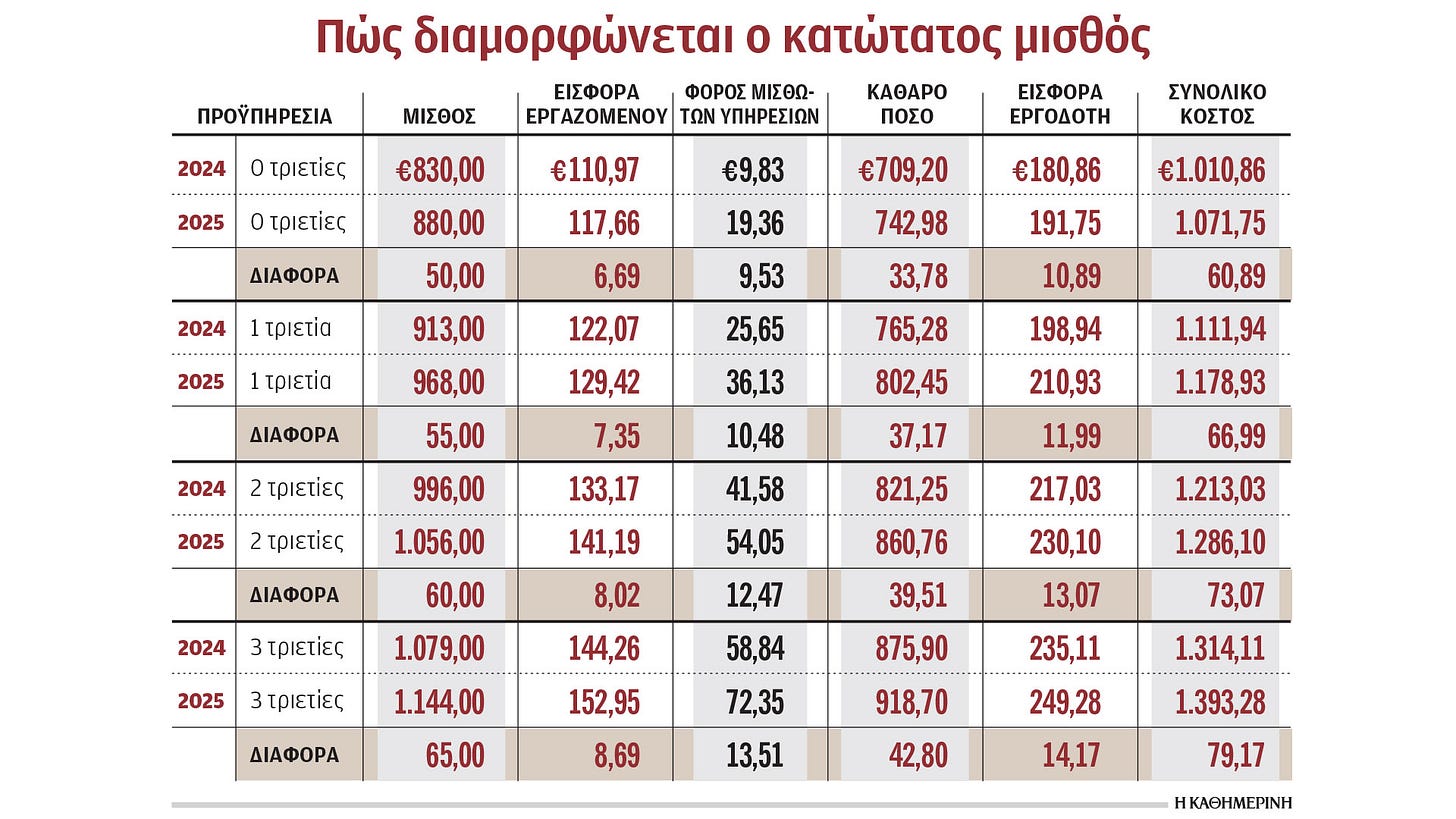
[Rant on]
Contrary to what you will hear today from the majority of Greek journalists, political parties and academic economists, I will go as far as to say that the minimum wage has increased too much and too fast in Greece — over and above the cumulative effects of inflation since 2020.
This rise will add up to (rather than help reduce) presently high inflationary pressures, it will reduce Greece’s competitiveness, add to our large current account deficit and create spill-over effects for employers to the rest of the salary ladder. I am the first to champion the cause of higher wages, especially for junior employees and entry level positions, which still remain depressingly low in many private and public sector jobs in Greece. HOWEVER, artificially inflating the minimum wage — rather than organically allowing the economy to recover and supporting wage growth by reducing high taxes, social security contributions and benefits — is a guaranteed recipe for disaster, even if it plays well with voters in the short-term.
[Rant off]
According to data from Eurostat, the minimum wage has increased 42% in the decade between 2015 to 2025 (even without factoring in the latest increase since April 1st).

This places Greece 12th out of 22 EU countries with a national minimum wage.
In this case, Greece falls in the last bucket of countries (minimum wage below €1,000).
In terms of Purchasing Power Standard (PPS), Greece ranks 14th out of 22.

This lifts up Greece to the middle category of countries (minimum wage between 1,000 and 1,500 in PPS).
According to the latest available data from the OECD, the real minimum wage in Greece in 2023 was the highest since 2011 — that’s a 13-year record.
This number should be expected to grow even higher in 2024 and 2025, given the consecutive increases in the minimum wage instituted by the Greek government.
Another important dimension to look at is the minimum wage relative to the average wage in a country. According to the International Labour Organization (ILO):
One useful and widely used statistical indicator is the ratio of the minimum wage to the mean or the median wage. As mean wages are affected by extreme values, median wages provide a better point of reference, especially in countries that have high wage inequality. This indicator shows the level of the minimum wage relative to that of the "average worker", and – to the extent that average wages reflect at least in part average productivity levels – also provides information on economic factors. (ILO 2015)
In Greece, the minimum wage is around 50% of the average wage.
Average full time salary per employee
The average full time adjusted salary per employee reached its highest level in 2023 since 2015 at €17k. Sadly, it still remains significantly below the EU average at €38k, a divergence that has been growing since the crisis started in 2009.
For context, Greece ranks 3rd from last in terms of its average annual full time adjusted salary per employee.

Average monthly salary (private sector)
In 2024, the average gross monthly salary in the private sector hit €1,342 per month. That’s a new record and marks a +32% increase since the 2015 lows.
What really matters is not just the average number but how the distribution of salary bands has changed over the past years.
In 2019, more Greeks were earning less than one thousand euros (< €1,000) in the private sector than more (> €1,000). In 2024, the situation has completely flipped.
Greeks are increasingly earning higher salaries in the private sector, with the largest category now making between $1,000 and $1,500 per month.
This is undoubtedly a very positive development.
Average monthly salary (public sector)
Following the increase of the minimum wage in April 1st 2025, the salaries will also increase across all salary levels and years of experience in the public sector.
Here is how public sector salaries are changing.
The 2025 salary increases range from 2.2% for higher salary bands to 3.53% for lower ones across the public sector. There have also been separate special increases for the armed forces, which range from 13% to 20%. You can find the majority of the changes in public sector salaries in these detailed tables.
Difference between private and public sector
Historically, there has been a large wage gap in favor of the public sector in Greece. Starting in 1985, and until around the crisis, it even touched +20-25%.

Since the 2015-2020s, this has changed drastically in favor of the private sector. In 2023, the average hourly and monthly wages of private sector workers were about +14.5% and +18.6% higher than in the public sector, respectively.
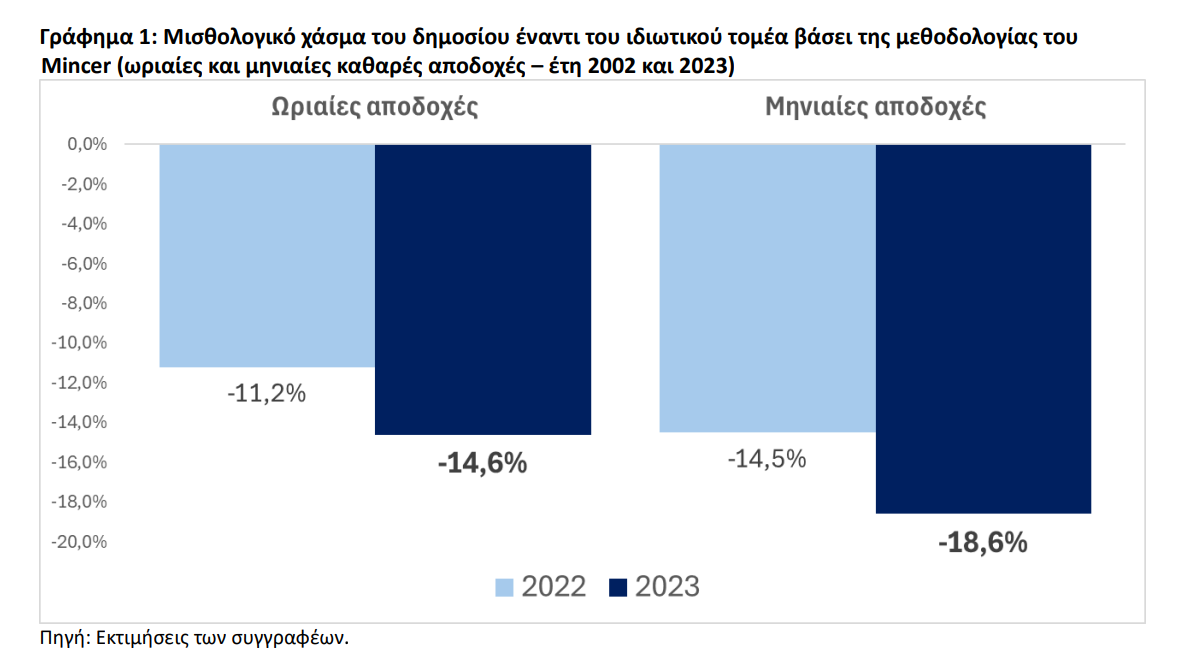
This change is particularly interesting because the allure of a steady (permanent) job in the public sector was a common goal for previous Greek generations (celebrated in the past, seen with more distrust today). This is also the way clientelism thrived in the country, and our public sector became notoriously large: local political parties built strong patronage based relationships with voters who were rewarded for their loyalty with positions in the public sector.
Public sector employees are still entitled to a series of extra benefits that are not counted in these analyses (in fact, some of these have been increased since April 1st) and also still enjoy the luxury of a permanent position (with minor exceptions).
Wage index
The Index of Wages Cost records the evolution of hourly labour costs (wages and salaries) by section of economic activity. It shows the short-term development of the total cost, on an hourly basis, for employers of employing the labour force.
In Q4 2024, Greece had the highest (best) Wages Cost Index rating in more than 16 years — that’s going back to even before the beginning of the financial crisis.
This was true when adjusting for seasonality.

And it was also true when adjusting for working days.

In Q4 2024, Greece’s nominal hourly wage costs for the whole economy were increasing faster than both the EU and Euro Area averages.

In simple terms, this means that employers are now increasingly paying higher wages and salaries to retain and attract their employees.
Household perceptions of income
One very important dimension when talking about salaries is the perception of wage earners. The ‘household pulse’ is critical in understanding how market participants feel about labour conditions and whether sentiment is improving or deteriorating.
To get the pulse of Greek households, we will take a look at the latest survey from the Small Enterprises Institute of the Hellenic Confederation of Professionals, Craftsmen, and Merchants (GSEVEE).
In 2024, 21% of households mentioned that their total annual income increased — that’s the highest number in 12 years. At the same time, only 26.2% of households reported a decrease in their total annual income — the second lowest number in the same time frame.
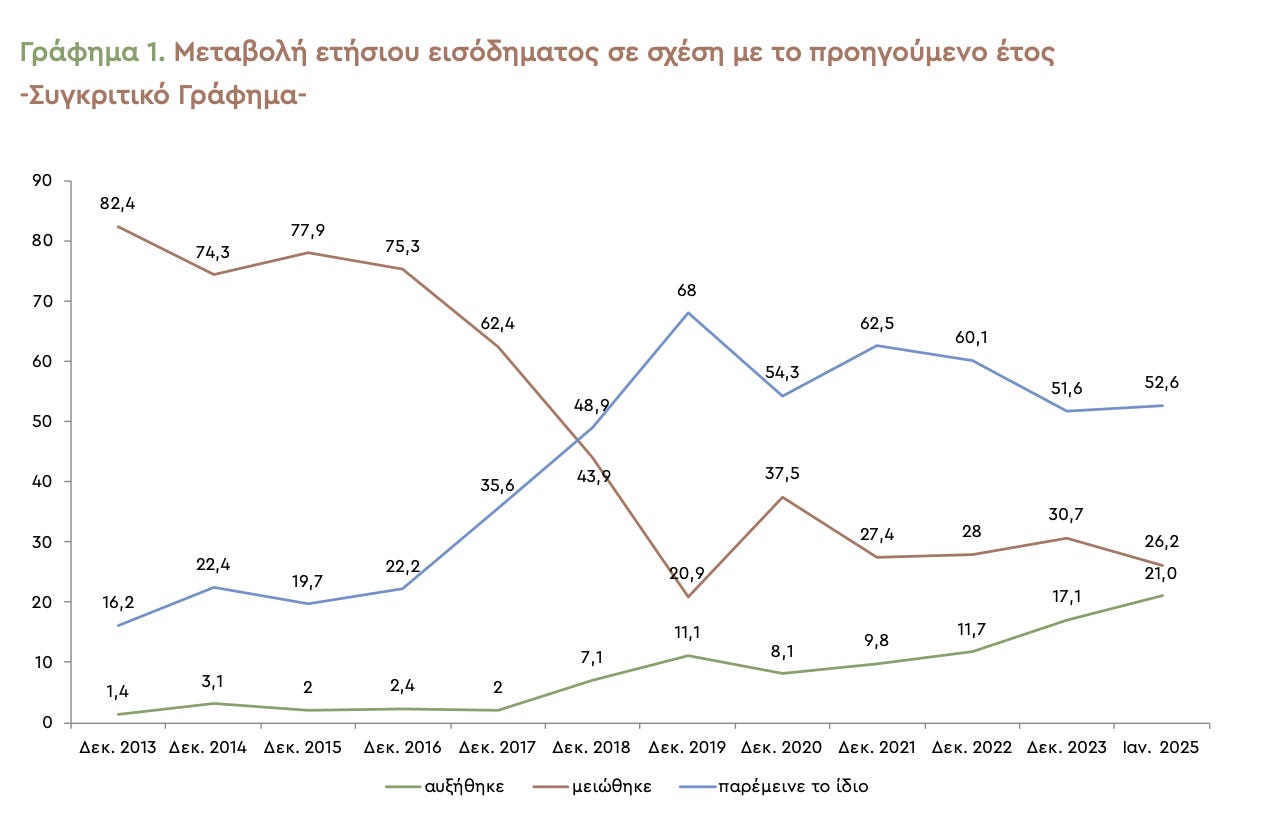
The vast majority of households that saw their income increase in 2024 earned more due to salary increases (vs pensions or corporate profits).

Sadly, 60% of households report that their monthly income is not enough to last the entire month, which is the second highest number since 2018.

It is clear that the dual forces of inflationary pressures and an ongoing housing crisis (especially in Athens) is eating up quickly the disposable income of families.
Across households with different economic characteristics, we see that 2024 was a marginally better year than 2023 for most categories.
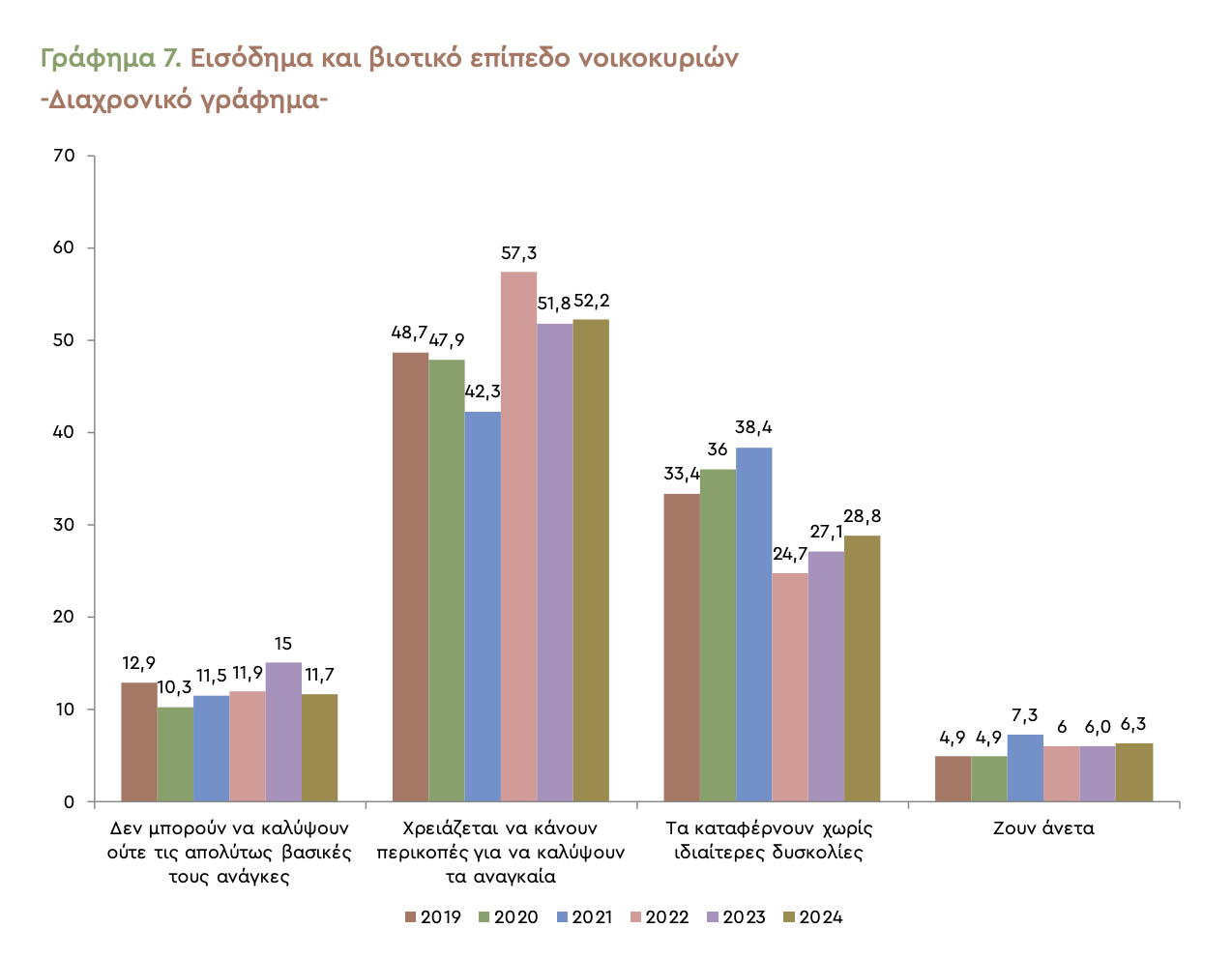
Sadly, the majority of Greek households (52.2%) belong in the category of “needing to make budget cuts in order to cover basic needs”. This means that even with the aforementioned salary increases most households are cutting back on their spending by necessity.
One hopeful indicator from household sentiment is their expectations of the future.

17.5% of households believe that their economic situation will improve next year, which is the highest rating in 5 years and second highest since 2015.
40.9% of households believe that their economic situation will worsen next year, which is the lowest rating in 5 years and 3rd lowest since 2015.
Income from property
The rising share of property income in the income composition of households can be observed in many countries across Europe, with Greece, France and Spain being the top contenders.
Property income growth since 2019 in Greece is outpacing the rest of Europe.

This is not a coincidence. If we look at Greece’s Rent Index, we see that rents are going up fast across the country.
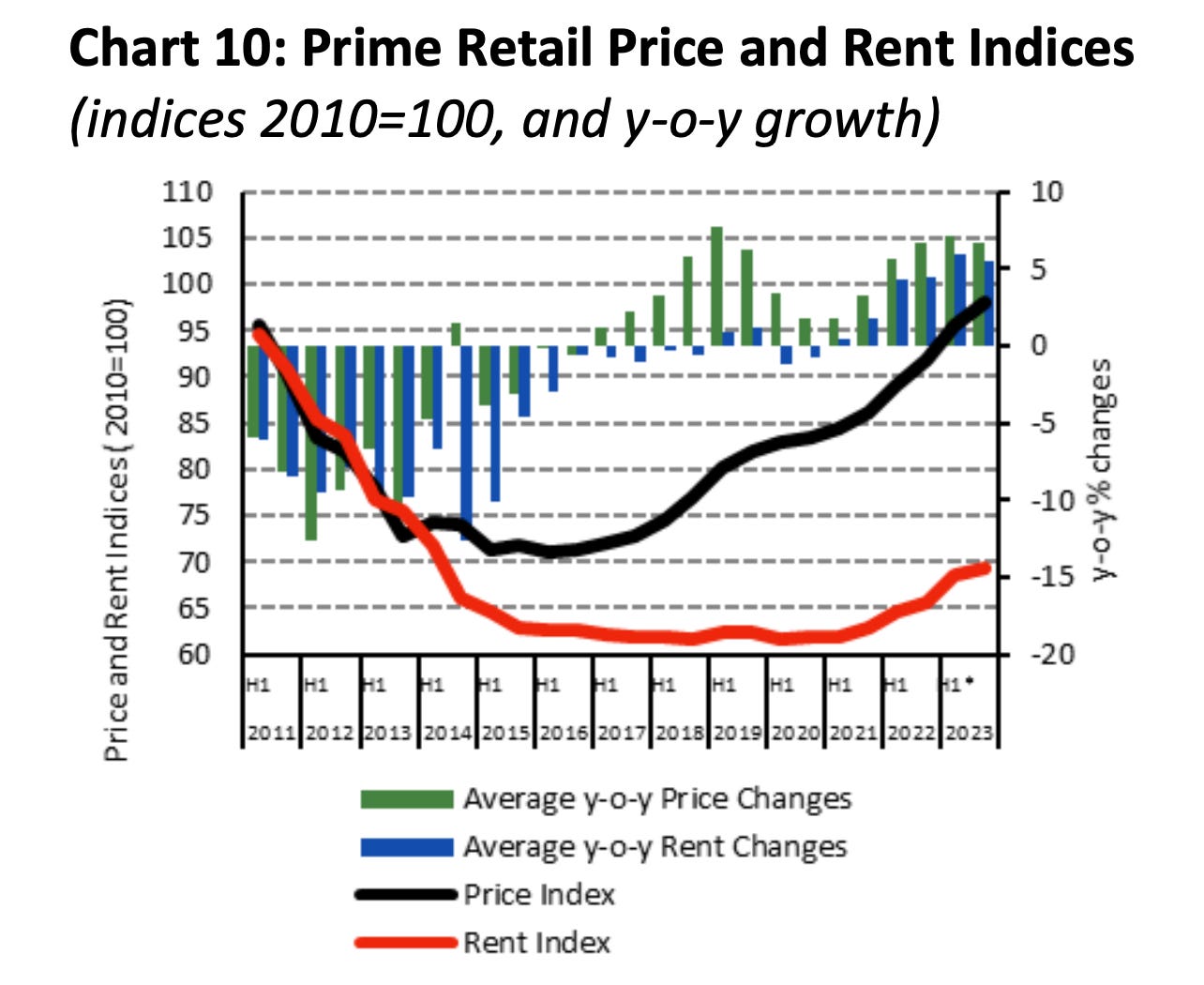
Compensation per employee
The compensation per employee rate in Greece has been consistently above the Euro Area average since the end of 2023.

Compensation per employee across major euro area countries has been decelerating consistently since early 2023. Greece’s compensation per employee growth also slowed down slightly in Q3 2024, after several quarters of accelerating growth.
Unfortunately, while compensation per employee in Greece has been rising, it nevertheless has grown slower than the level of inflation (CPI Index).
Real compensation per employee (i.e. adjusting for inflation) has been consistently below EU average and falling. That’s also true for real compensation per hour worked.
Greece has historically been far from the EU average, but the divergence has grown much larger since the beginning of the crisis in 2009.
Labour compensation
Labour compensation is growing strong, outpacing the annual growth of corporate profits and household mixed income for a 6th quarter in a row.

NBG expects labour compensation to increase in 2025 as unemployment keeps falling steadily over the course of the year and “tilting bargaining power towards labor.”
In terms of hourly labour costs, Greece has been consistently underperforming the European average, widening the gap with it throughout the crisis and until today.
On the bright side, Greece’s average hourly labour cost in 2024 was the highest in more than 12 years. Unfortunately, it also remains 21st out of 27 EU countries (or 7th from the end), surpassing Croatia, Lithuania, Latvia, Hungary, Romania and Bulgaria.
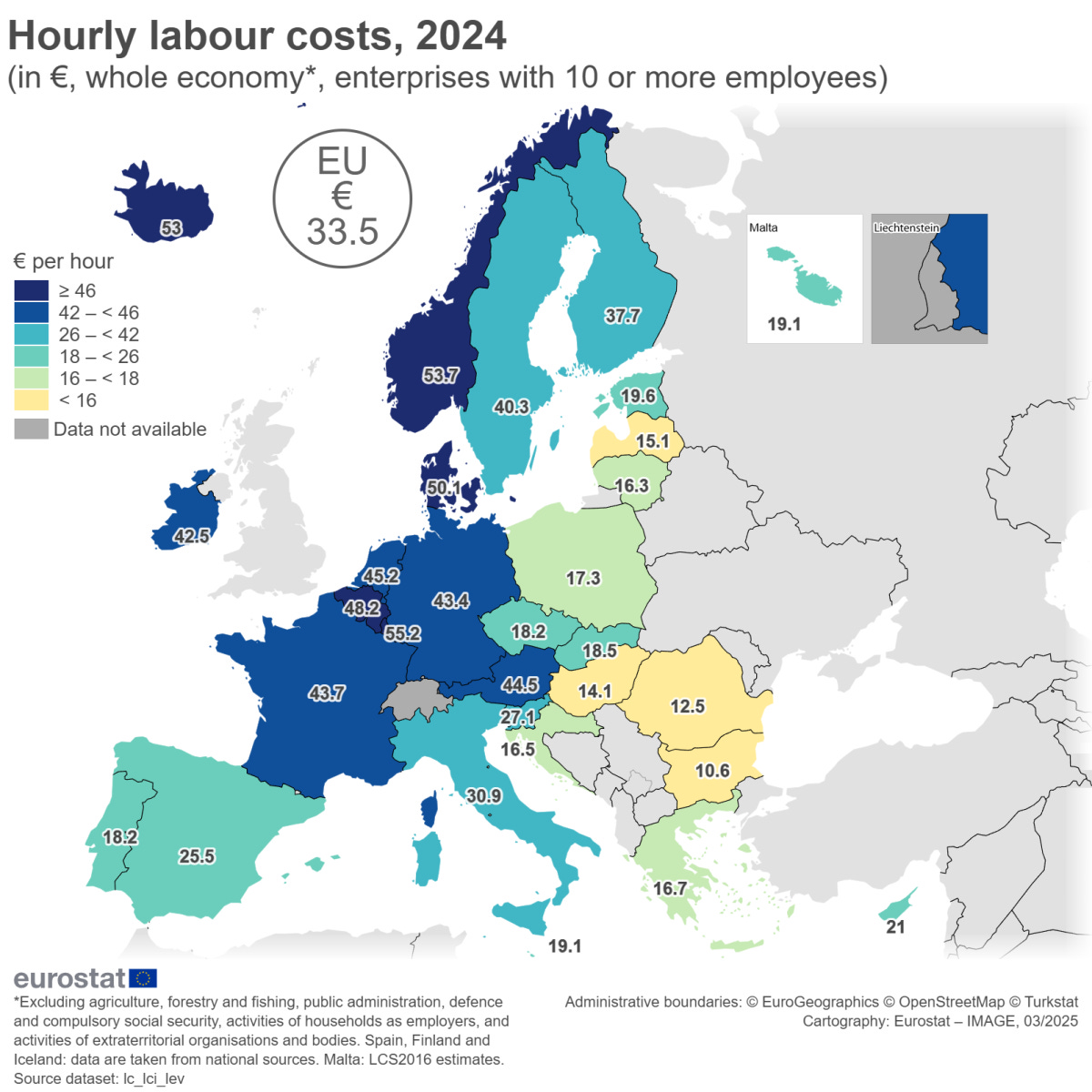
Conclusion
Throughout the past year, the Greek government has painted a very rosy picture of amazing improvements in salary levels, while opposition parties have likened Greek salary conditions to the Middle Ages and claimed everything is regressing fast. Both are wrong. The reality is far more complicated than local politicians are portraying.
Greece’s minimum wage has seen a tremendous recovery in real terms. Top level indicators have been consistently positive. The average salary has improved steadily in nominal terms, but the creeping effects of inflation have either negated or significantly reduced real gains in the eyes (and pockets) of many salaried employees.
There is no doubt that Greece has been making progress on its wage dynamics in recent years. However, the distance with the EU average remains vast and has only been growing since the beginning of the crisis. 2024 marks another year of improvement in net terms, but the momentum has been gradually decelerating, which means that we should expect relatively measured improvements in the near future.
🏭 Economy & Business

Greek stock market has been second best in world after Poland in Q1 2025
Greek stock market closed at +4.8% in March, 3rd positive month in row
Unemployment fell to 8.6% in February 2025, employed people surpass 4.3M
Inflation still above 3%, remains significantly above EU average
Retail trade up 2.5% year-on-year in January 2025
GDP per capita in PPS still below EU avg but marked 10y record in 2024
€75 million hydrogen fuel cell investment project is in the works in Kozani
Alpha Bank is acquiring local investment bank group AXIA Ventures
🤖 Tech & Startups
Hellenic Centre for Defence Innovation (HCDI) publishes R&D projects for 2025 and announces two calls for the development of electronic surveillance systems
Runway (video generating AI) raised $308M in Series D funding
Galatea Bio (AI genomics) raised a $25M Series A round
Wealthyhood (investing platform) raised a €3.6M seed-round
PlugSecure (EV security) raised €0.7M led by Apeiron Ventures
Amazon announces new AWS Direct Connect location in Athens, first in Greece
ION’s Pignataro plans €2 billion technology hub on the Greek coast
Planet signs contract with ESA to support Greek national space services
Skretas Lab has created ProteoSeeker, a bioinformatics tool for metagenomic analysis
Velos Rotors gets their drones highlighted in The Telegraph
Research in Greece, a useful critical perspective by Professor Anastassis Perrakis
🙌 Celebrating Greek wins

Robert A Mccabe is a great philhellene, legendary photographer and the Athenian of the month according to LiFO
Maroula Kliafa is a master storyteller and the voice of Thessalia in Greek literature
Theodoros Panagiotakopoulos has co-founded The Good AI Lab
Emmanuel Kymakis was elected Fellow of the European Academy of Sciences
Leonidas Taliadouros wins 1 of 10 Professional Development Scholarships at Columbia University
📊 Chart of the week: Greece and the global gender gap
In 2024, Greece achieved its best score ever in the Global Gender Gap Index (GGI). It also secured its best rank in the global leaderboard since 2010 — a 15-year record.
Some welcome news, although there still remains an enormously long way to go.
That’s it for today! If you enjoyed today’s newsletter, please let me know with a like or reply. And if you value the content shared here every week, consider pledging your support. Thanks.
Find me on X or Bluesky for bite-sized opinions.
Until next time!









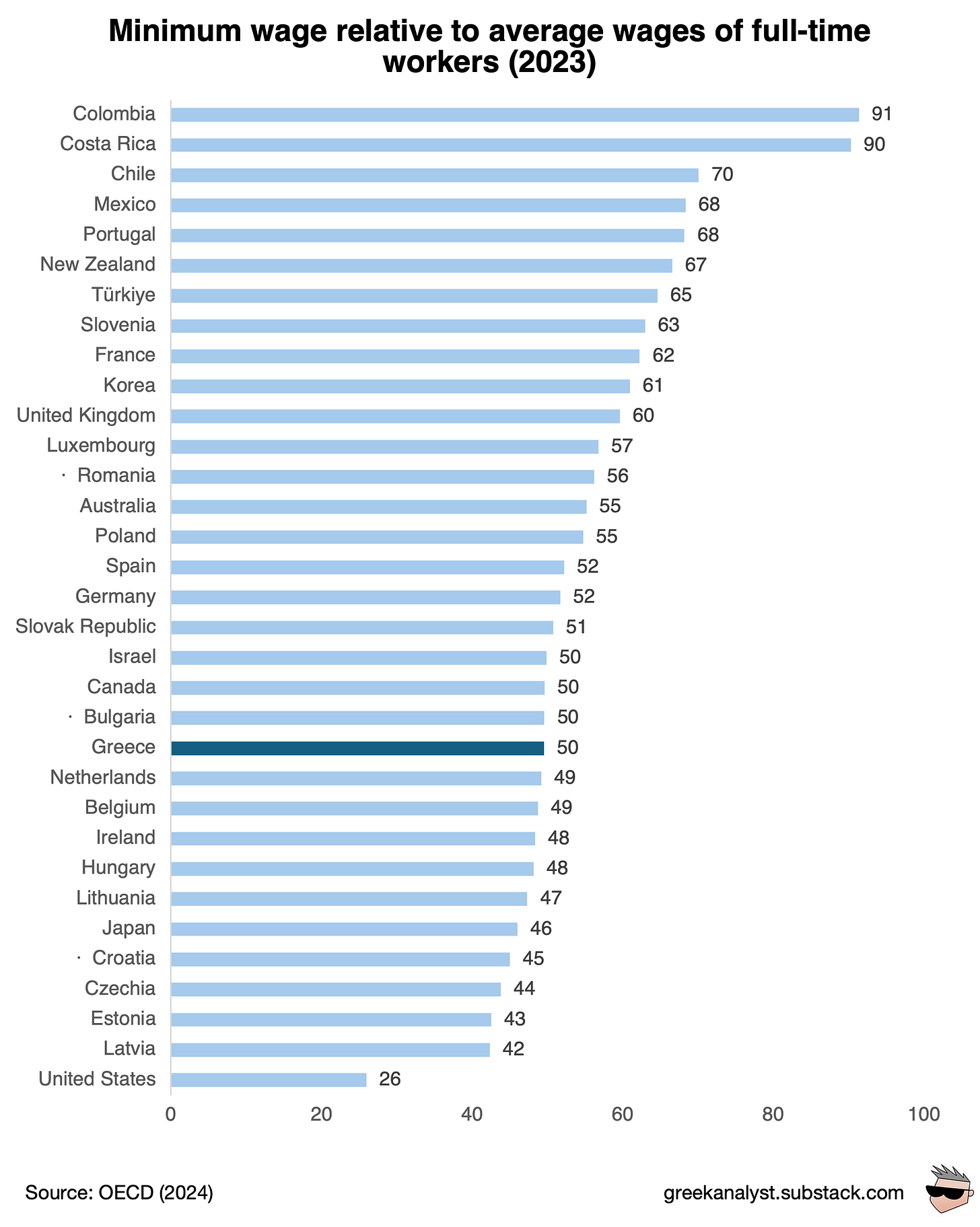
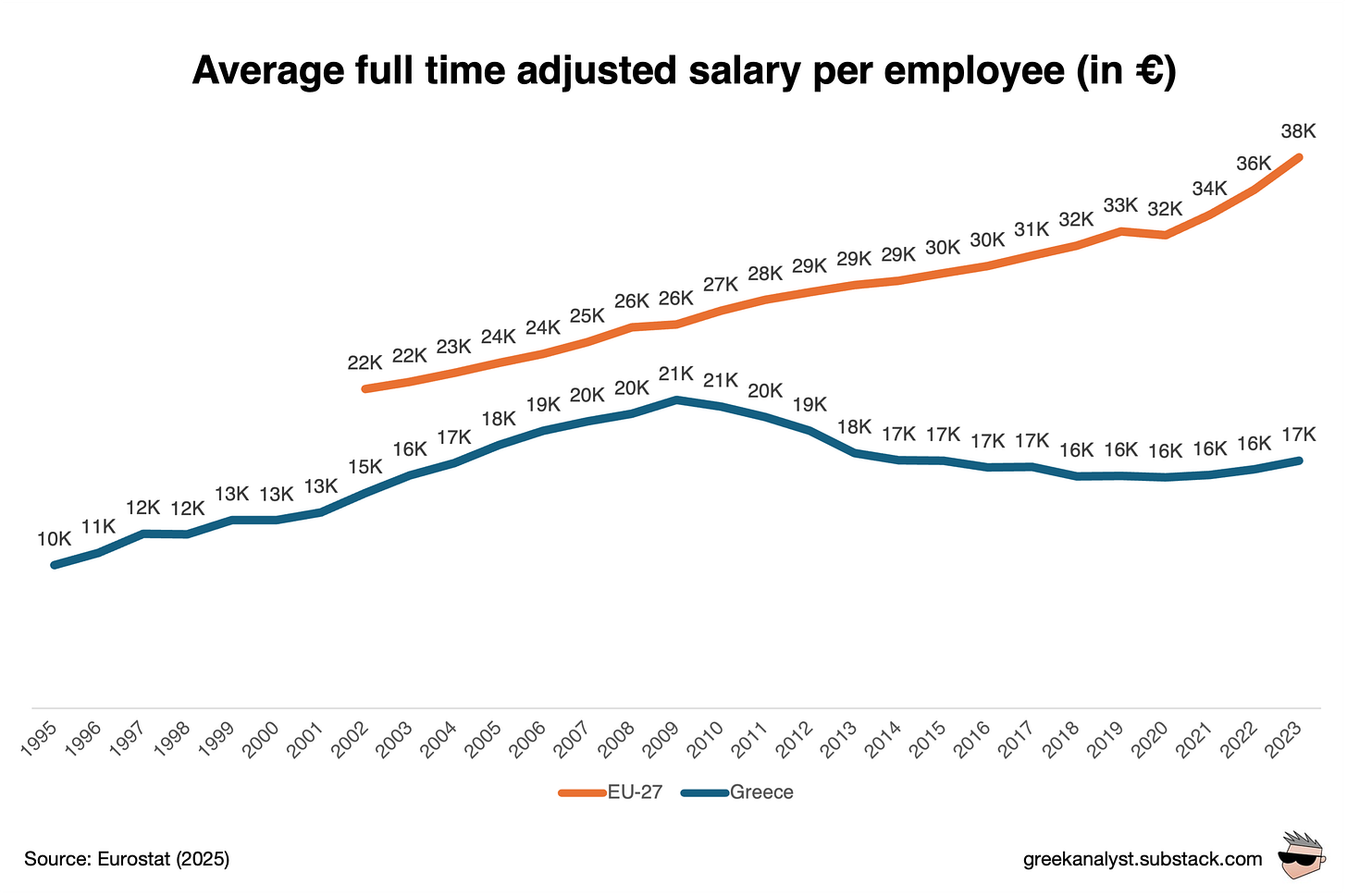

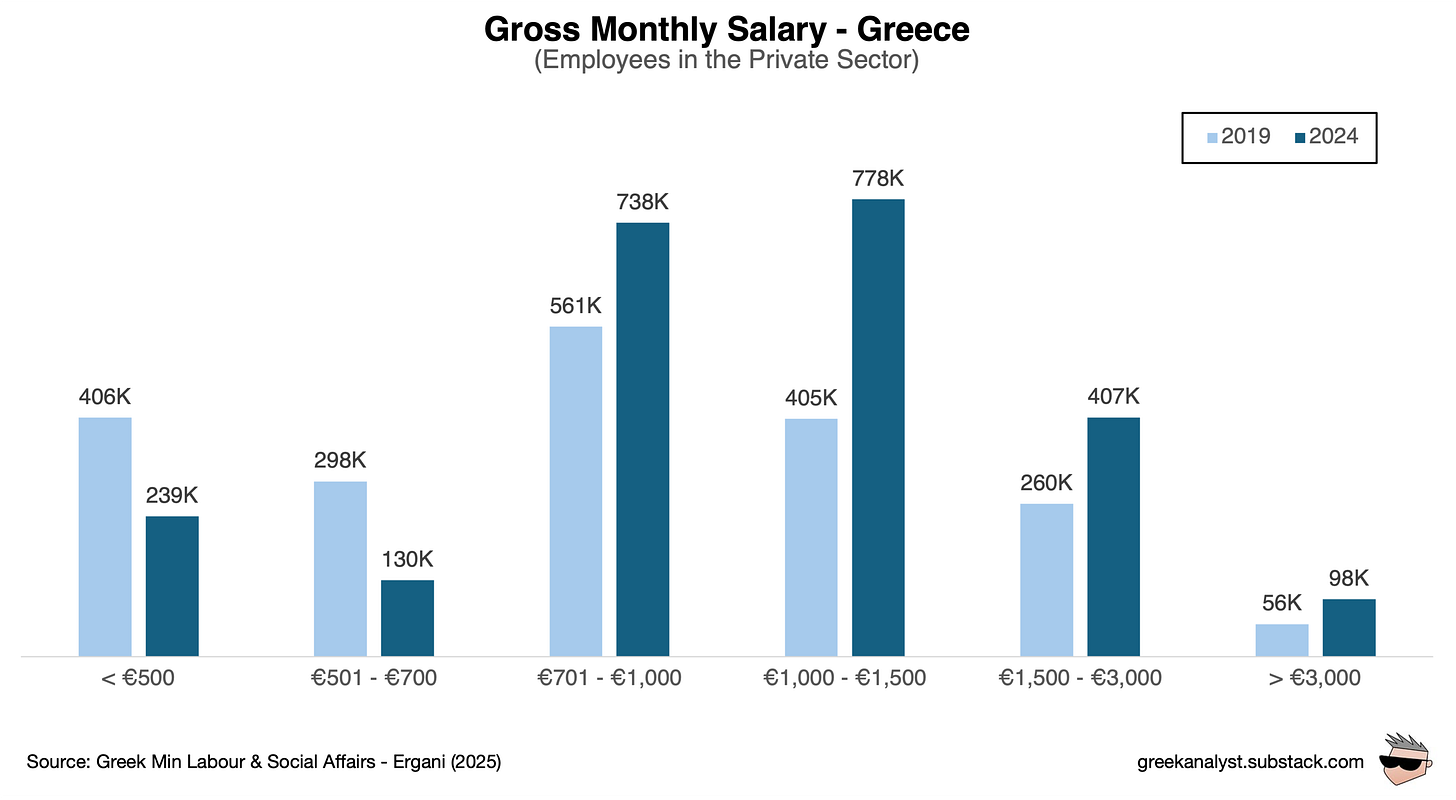

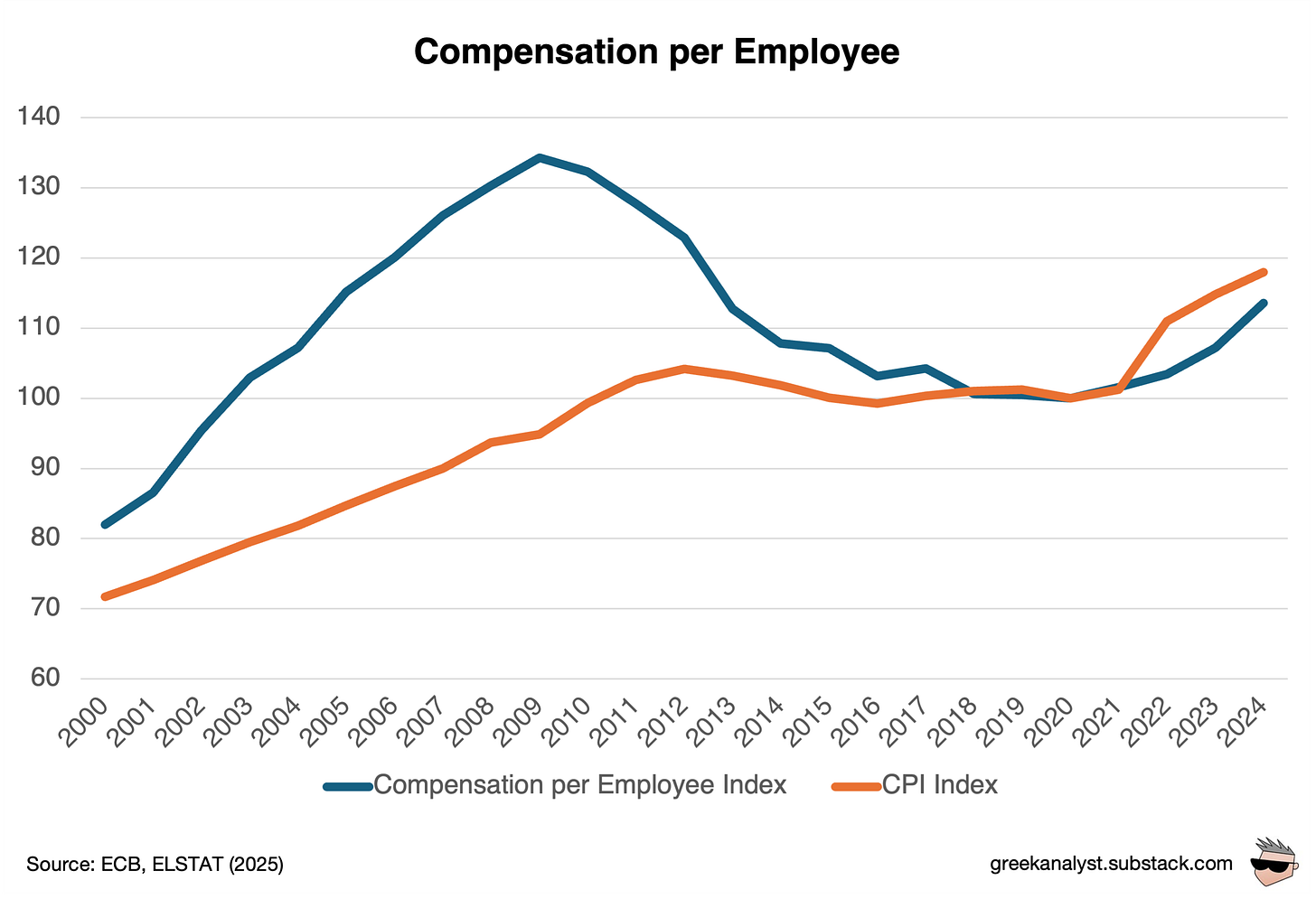




Very interesting!
It's astonishing to see that public sector positions are still "permanent" even in 2025.
Academic tenure for a whole country.
Having been living in Lithuania for a year, I did notice that in many charts the income numbers of Lithuania and Greece are very similar. Which got me thinking...
One similarity I can mention is that lots of small businesses ask to be paid in cash there as well (I wonder why).
At the same time, the number of expensive cars I can notice in parking lots and streets, doesn't align with a "low" income they show on paper. They definitely make more than what I can see in those charts.
In Greece, I cannot say I have a clear proxy for it, but I have a feeling there might be a similar discrepancy.
Effectively, my question is, how is the "shadow economy" reflected in those charts?
Curious to know if it's measured in any way.
---
Also, I can see a very clear correlation of "years of experience" with salary.
Is it that prevalent that the amount of money someone makes depends almost exclusively to how many years they have worked, as opposed to, you know, how good they are at what they do?
Coming from having worked in several northern European countries, this is very strange.
There, salary depends almost exclusively to what you can negotiate based on your skills, not at all to how many years you can show in a certain position. Plenty of cases I can show where a new skilled engineer makes more than a manager with 5-10 years at the same team.
And that's how it should be in a healthy economy.
I'm curious on what makes even the private sector stick to that pattern. To reward loyalty to the company?
---
Thank you once again for the interesting post!
(I'd suggest, if you can, to "explain" more on each chart. Some times I'm not really sure what I'm looking at. It would be useful if you give a bit more of a back story to what a chart is trying to say)